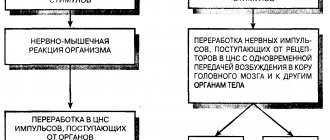People experience different emotions every day - sometimes good, sometimes not so good. This has become so commonplace that we don’t even think about how and why emotions appeared in our ancestors. But they were very important! We experience many emotional impulses, but among them there are seven most important, basic emotions, without which our life would be completely different. It is them that we will talk about now.
Every emotion is involuntary if it is sincere. Mark Twain
Basic emotion - Fear
This emotion arises as soon as a person feels danger. Often a frightened person loses the ability to adequately perceive reality and does not even pay attention to the opportunity to avoid danger. Fear also helps to increase the distance between a person and what he perceives as danger, trying to get as far away from it as possible. The greater the distance, the less visible the danger.
Fear is the number one emotion that forces our minds to work incredibly hard to get rid of it. Jodie Foster
Thanks to fear, a person finds the path in which he needs to move and receives changes. At the same time, it is fear that makes it possible to overcome danger, so this emotion can be considered an extremely powerful resource and assistant.
Response scale
This technique is a questionnaire of 25 statements that determines the degree of development of empathy in an individual.
The person taking the test needs to rate his/her agreement: always, often, rarely, never.
| № | Judgment | Answer | |
| IN | H | R | N |
| 1 | I feel sad when I see someone feeling lonely in company. | ||
| 2 | When those around you cannot restrain themselves and openly show their emotions, it is unpleasant. | ||
| 3 | When a person gets excited next to me, I feel the same. | ||
| 4 | I believe that tears of happiness are stupid. | ||
| 5 | I also experience the troubles of my friends. | ||
| 6 | Sometimes love songs make me sensitive. | ||
| 7 | I would be very worried if I had to convey bad news to anyone. | ||
| 8 | My condition is greatly influenced by my environment. | ||
| 9 | I would like to have a job that involves communication. | ||
| 10 | I love seeing people receive gifts. | ||
| 11 | When I see/hear that a person is crying, I get upset myself. | ||
| 12 | Listening to certain music makes me feel happy. | ||
| 13 | When I read a work of fiction, I worry so much, as if all this is happening in reality. | ||
| 14 | I get angry when I see a person being treated horribly. | ||
| 15 | I can remain calm even when everyone around me is panicking. | ||
| 16 | It makes me nervous when people shed tears. | ||
| 17 | When I make a decision, no one else's opinion usually matters. | ||
| 18 | I also get angry when people around me are worried about something. | ||
| 19 | I get worried if I see people worrying about trifles. | ||
| 20 | I get worried when I see animals suffering. | ||
| 21 | It's stupid to worry about what happens in a book or movie. | ||
| 22 | I feel sad when I see weak people. | ||
| 23 | I get very emotional when watching a film. | ||
| 24 | I can be indifferent to any disturbance going on around me. | ||
| 25 | Children cry for no serious reason. |
Results
| № | Number of points per answer | |||
| B – I agree (always) | H - often | R - rarely | N - never | |
| 1 | 4 | 3 | 2 | 1 |
| 2 | 1 | 2 | 3 | 4 |
| 3 | 4 | 3 | 2 | 1 |
| 4 | 1 | 2 | 3 | 4 |
| 5 | 4 | 3 | 2 | 1 |
| 6 | 4 | 3 | 2 | 1 |
| 7 | 4 | 3 | 2 | 1 |
| 8 | 4 | 3 | 2 | 1 |
| 9 | 4 | 3 | 2 | 1 |
| 10 | 4 | 3 | 2 | 1 |
| 11 | 4 | 3 | 2 | 1 |
| 12 | 4 | 3 | 2 | 1 |
| 13 | 4 | 3 | 2 | 1 |
| 14 | 4 | 3 | 2 | 1 |
| 15 | 1 | 2 | 3 | 4 |
| 16 | 1 | 2 | 3 | 4 |
| 17 | 1 | 2 | 3 | 4 |
| 18 | 4 | 3 | 2 | 1 |
| 19 | 4 | 3 | 2 | 1 |
| 20 | 4 | 3 | 2 | 1 |
| 21 | 1 | 2 | 3 | 4 |
| 22 | 4 | 3 | 2 | 1 |
| 23 | 4 | 3 | 2 | 1 |
| 24 | 1 | 2 | 3 | 4 |
| 25 | 1 | 2 | 3 | 4 |
| Sum |
Now calculate the results:
- 11 points - extremely reduced level of empathy;
- 12-36 - low;
- 37-62 - normal;
- 63-81 - high;
- 82-90 - elevated.
Basic emotion - Anger (Rage)
This emotion encourages change in an unsatisfactory situation. Anger can be very constructive if it is aimed at changing the situation, but if no changes are observed, then it begins to play the role of a destroyer.
Rage/Anger is an emotion in its purest form. This is one of the most ancient mental states of man, being something or someone brought to the boiling point or in moments of danger. This emotion is large, huge and grandiose, it takes omnipotent power over you. Mark Ruffalo
But first of all, anger is a signal for a change in relationships with certain people, because in order to build something new, it is necessary to destroy the old.
Facial expressions hide human emotions
Facial expressions help hide a person's emotions. With age, each individual learns to control emotions and hide them. One of the most common positive emotions is interest. Thanks to this emotion, people are able to develop their skills and intelligence.
Interest is a motivating emotion. Interest helps you work and be creative. Visual interest is characterized by slightly tense or raised eyebrows, pursed lips or a slightly open mouth. This facial movement lasts less than 5 seconds, but the emotion itself is experienced much longer.
Basic emotion - Disgust
This is a reaction of rejection that can manifest itself both in connection with certain people and, say, with unpleasant odors.
In this case, the relationship will no longer be able to develop, since the person experiencing this emotion will consciously distance himself from the one who caused it. Disgust is beneficial if it helps to isolate oneself from something that can have a destructive effect.
Emotion: psychology and its role
Emotion is a short-term mental process that shows the attitude towards a particular situation.
Emotion consists of three components:
- A conscious and experienced sensation of emotion;
- processes in some body systems;
- external signs: gestures, facial expression, voice.
Psychology cannot yet give an exact answer to the question of what emotion essentially is.
Scientists have four versions:
- Feelings and emotions are one and the same.
- Feelings are types of emotions.
- Feelings give rise to various emotions.
- Feelings and emotions are different mental processes.
Basic human emotions are similar among representatives of all cultures. An innate neural program forces different people experiencing the same emotion to use the same facial expressions and gestures. (For example, clenching your teeth in anger).
Basic emotion - Contempt
This is an emotional reaction that gives a negative assessment of events or people, while neutralizing the significance of the object of contempt. At the same time, the one who experiences this emotion feels superior.
The worst emotion that destroys compatibility between people is Contempt. When you look down on another, you mock him, say: “You are a loser” - that’s all, the relationship is over. Victor Vladimirovich Gulenko
This emotion can be extremely destructive for a person, but it can also be beneficial if it acts as a way to evaluate an unworthy act. However, you can also feel contempt towards yourself, which can help you change your personality and make it better.
How are feelings different from emotions?
Close in meaning, but still not identical, are the concepts of emotions and feelings. In scientific psychology, these terms define different components of a single emotional background.
Feelings are deeper states that determine a person’s stable attitude to surrounding events. They are often less pronounced and have smoothed manifestations. Emotions are a reaction-outburst to a specific situation, causing vivid manifestations, often born unconsciously. In psychology, feelings are more conscious manifestations of attitudes towards a particular object. A person can experience the whole gamut of emotions, but at the same time not show feelings if there are no prerequisites for this. For example, do not hate an enemy if the enemy does not exist. At the same time, show anger if something served as a reason for this.
The feelings inherent in a particular person are significantly influenced by the society surrounding the space. Emotions are a subjective assessment based on an internal understanding of reality and the characteristics of the nervous system.
Types of feelings
In fact, this part of the perception of the environment is difficult to classify, since it is multifaceted and diverse. Conventionally, psychology defines the following types of feelings:
- moral;
- intellectual;
- practical;
- aesthetic.
| Category | Subcategory | Manifestations | Characteristic |
| Moral | Moral | Humanity | Relationships between people, attitudes towards one’s own position in society, determination of acceptable behavior, the limits of what is permitted. |
| Patriotism | |||
| Call of Duty | |||
| Love | |||
| Immoral | Cruelty | ||
| Selfishness | |||
| Hatred | |||
| Greed | |||
| Intelligent | Specific | Inspiration | Determine attitude to intellectual needs. |
| Determination | |||
| Thirst for knowledge | |||
| Satisfaction from new knowledge and discoveries | |||
| Nonspecific | Curiosity | ||
| Astonishment | |||
| Humor | |||
| Irony | |||
| Praxic | Choice of activity | Profession | They determine the attitude towards everyday worries, responsibilities, and relationships with society. |
| Favorite leisure activity | |||
| Interesting activities | |||
| Aesthetic | Satisfaction from seeing, touching, listening | Love for nature | Determine the range of interests aimed at satisfying aesthetic needs |
| Love for technology | |||
| Favorite music | |||
| Works of art, architecture, sculpture |
There are more complex feelings that cannot be clearly attributed to one of the types. For example, love awakens a person to strive for knowledge, to reveal aesthetic potential, inspires, and determines the choice of activity.
Ensuring survival
Fear. The basis for survival on earth and conservation of the species. Under its influence, ancient people sought shelter from natural phenomena and wild animals.
Caution and the instinct of self-preservation developed. Fear of pain taught me to avoid its sources and think through my steps, preventing danger.
Pleasure. You can name many synonyms, but they all fit under one definition - this is what gives the highest degree of pleasure, satisfaction and the desire to experience similar feelings again
This is easily illustrated using the example of a baby. Most observed the baby's reaction to stroking the tummy and a clear manifestation of bliss and happiness.
All other manifestations are derivatives of two basic emotions. This can be proven: joy is an elevated feeling, akin to euphoria, from achieving a goal, an unexpected event, causing fun, jubilation and delight. But the basis of this feeling is the pleasure received. Otherwise, we can say that joy is rejoicing from an action that brings pleasure. You can also consider sadness. It also stands out as one of the main ones. But one can easily understand that sadness is a derivative of both fear and pleasure. In the first case, it is caused by the inability to achieve what you want. And in the second, on the contrary, from the expectation of greater pleasure than what was received.
What types of emotions are there?
There are a large number of emotions, thanks to which we have the opportunity to better perceive our world. Until recently, scientists believed that there were only 7 basic feelings. However, recent studies have proven that there are many times more emotions, about 27.
Globally they are divided into three parts: positive, neutral and negative. According to the degree of manifestation, they can be sthenic (manifest very actively) and non-sthenic (almost not manifest).
Despite the fact that in the global sense there are only 3, there are many more subtypes:
- Basic. These emotions are inherent to every person. They do not depend on gender, age, nationality. Everyone knows how to be sad and happy;
- Variable. Due to territorial characteristics;
- Congenital. Emotions we are born with. For example, fear of heights;
- Purchased. Emotions that we acquire throughout life. For example, after a car accident, people may become afraid to drive private vehicles;
- Elementary. Neutral. Mainly emotions of calm;
- Composite. They are a combination of elementary;
- Natural. Inherent in man by nature
- Cultural. Emotions received in the process of learning from their parents or mentors;
- Cognitively simple. We experience such emotions as a result of instant reactions to any stimulus;
- Cognitively challenging. Unlike cognitively simple ones, such emotions are born after a deep understanding of what happened.
Thanks to the expanded classification system of our functions, we have many possibilities for expressing emotionality.
Positive emotions
As mentioned above, emotions can be negative and positive. Most people like to feel good, and positive emotions help us feel uplifted and more comfortable. Positive emotions usually do not need a reason; we feel them involuntarily.
Experiencing emotions such as happiness, excitement, joy, hope and inspiration are vital for anyone who wants to lead a happy and healthy life. Luckily, you don't have to experience them all the time to reap the benefits of positive emotions
These moments, often fleeting, can be what makes your life better and brighter.
Beyond just feeling good, positive emotions are also an important part of happiness. Moreover, happy people live longer and work better
Negative emotions
Negative emotion or affect is the experience of negative emotions such as anger, frustration, guilt, nervousness and fear. Causing negative emotions in your friends when they are enraged by your behavior is one of the ways to make them angry.
Therefore, it is important to learn how to prevent negative influences from affecting you and instead create positive emotions. To do this, it is enough not to be an irritant to other people and behave correctly in certain situations
It is important to understand how much your behavior will be accepted by society at the right time.
A person can mask his emotions depending on the situation in which he finds himself. In our society, many emotions are considered to be a sign of weakness, therefore, people often hide their emotional experiences and try to smile in those moments when there is no joy in their souls
Izard's Differential Emotions
The scientist identified the following fundamental experiences:
- Interest. This feeling is directly related to a person’s sociality. Only with him is it possible to acquire new skills, knowledge, skills, and develop physically and mentally.
- Pleasure. It is a kind of synonym for joy. Creates a positive background, a good, cheerful mood. Appears when there is an opportunity to satisfy an important need for an individual. It can increase self-confidence, facilitate the process of establishing communication, and get rid of anxiety and stress.
- Astonishment. A short-term reaction to a collision of the psyche that has just occurred with a certain unexpected event, phenomenon or action.
- Anger. A negative state characterized by the impossibility of getting what you want, failure, or dissatisfaction with someone's behavior. The uncontrollable form is rage.
- Disgust. It arises due to interaction with an object that is unpleasant for the individual. Accompanied by a thirst to get rid of the provoking factor.
- Contempt. It manifests itself in the process of disagreement between people’s beliefs and actions.
- Shame. It is formed due to the inconsistency of certain aspects of the personality with one’s own requirements or public opinion. It is often accompanied by an unpleasant feeling of helplessness.
- Guilt. It arises as a result of condemnation of one’s own behavior. Brings with it repentance.
- Fear. Associated with the awareness of an emerging or imaginary threat to life.
- Grief. Reaction to negative events.
There is also a scale that allows you to determine the prevailing emotional state of an individual.
| Manifestations | Sum of points | Category | |
| Attentive | Concentrated | Assembled | C1 Interest |
| Enjoying | Happy | Glad | C2 Pleasure |
| Surprised | Amazed | Stricken | C3 Surprise |
| Sad | Sad | Broken | S4 Grief |
| Excited | Angry | Insane | C5 Anger |
| Dislike | Disgust | Disgust | C6 Disgust |
| Contemptuous | Neglecting | Haughty | S7 Contempt |
| Frightened | Horrified | In panic | C8 Fear |
| Shy | Timid | Shy | C9 Shame |
| Sorry | Guilty | Repentant | C10 Wines |
Face-to-face consultation
What are the features and advantages of face-to-face consultation?
Skype consultation
What are the features and benefits of Skype consultations?
To determine your emotional state, you need to evaluate your current state of health in each column:
1 – absolutely not suitable;
2 – more likely yes than no;
3 – consent;
4 – completely true.
Next, count the sum of points in the lines of the list and calculate the coefficient using the formula:
KS = (C1 + C2 + C3 + C9 + C10) / (C4 + C5 + C6 + C7 + C8)
If the obtained value is >1, then the result is assessed as positive if
How to learn to control your emotions
To avoid an outburst of emotions, it is worth taking a few simple steps to calm your agitated spirit and restless mind. When the situation passes, believe me, you will thank yourself for being able to keep your emotions in check and become your own boss.
Fully managing yourself emotionally requires mental discipline and sacrifice. For those who are primarily familiar with their sentimental experience, managing emotions can be one of the most difficult aspects of life.
Having a reliable method in your arsenal is a game changer. We are going to share a technique that many famous people use to constantly monitor their condition and free their mind from constant indulgence in the vast emotional palette offered to us all.
Everyone experiences negative and unproductive thoughts, and most of us can remember ones that have left us confused, wondering what alternate universe or reality they came from.
You can't always control the crazy things that come into your head, but you can control how long that thought stays constant, whether you allow it to take root, influence your feelings, and ultimately dictate your actions. Although you cannot have absolute control over your feelings, you can control some of them through closed action.
The path of closed action is a phenomenon in which a person suppresses feelings within himself for a certain period of time. For example, it is better to contain your anger if you are sitting in your boss’s office.
Depending on what emotions a person experiences. Internal energy in the body is concentrated in the form shown in the figure. Understanding this, you can direct the flow of this energetic charge in the right direction and learn to control yourself in any situation










